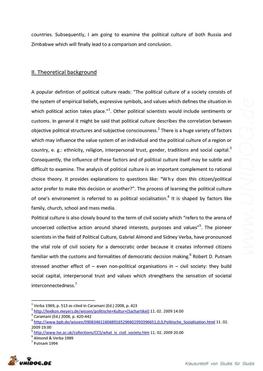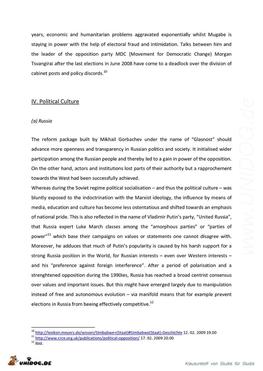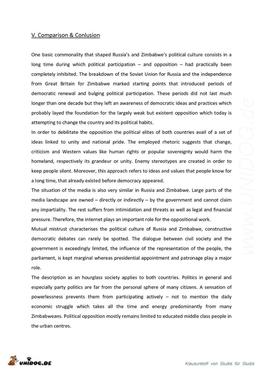| Dokumente | |
|
|
Dokumentvorschau |
Political Culture in Russia and Zimbabwe |
Dokument-Nr.: F-ABU9 |


|
|
Dokument-DownloadUm Zugriff auf dieses Dokument zu erhalten, musst Du Mitglied der UNIDOG Community sein. |
|
Inhalt / Beschreibung
Political Culture in Russia and Zimbabwe
Gliederung: I. Introduction II. Theoretical Background III. Historical Background (a) Russia (b) Zimbabwe IV. Political Culture (a) Russia (b) Zimbabwe V. Comparison & Conclusion
In the following paper the attempt shall be made to compare Russia and Zimbabwe with regard to their political culture. The first impression might suggest that there is an immense amount of differences which make a comparison between these countries rather implausible. Nevertheless I assume to discover a couple of similarities as far as the political culture is concerned. This assumption is based on the fact that both countries are nominal democracies with constitutions, party systems, elections being held etc. but with a strong deflexion towards authoritarianism. It is generally agreed nowadays that democracy as a form of government can only be successfully implemented if the actors and citizens internalise it as a form of life and thinking as well – so maybe a failing democracy can also be explained by a failed internalisation of democratic values. Secondly, from its independence until the breakdown of the Soviet Union, Zimbabwe has been fairly oriented in the direction of the communist Russia. After having explained the basic theoretical background of the issue of political culture, I am going to give a brief summary of important, more recent historical developments in the countries. Subsequently, I am going to examine the political culture of both Russia and Zimbabwe which will finally lead to a comparison and conclusion. |
|
Vorschau-Ausschnitte
|
||||







